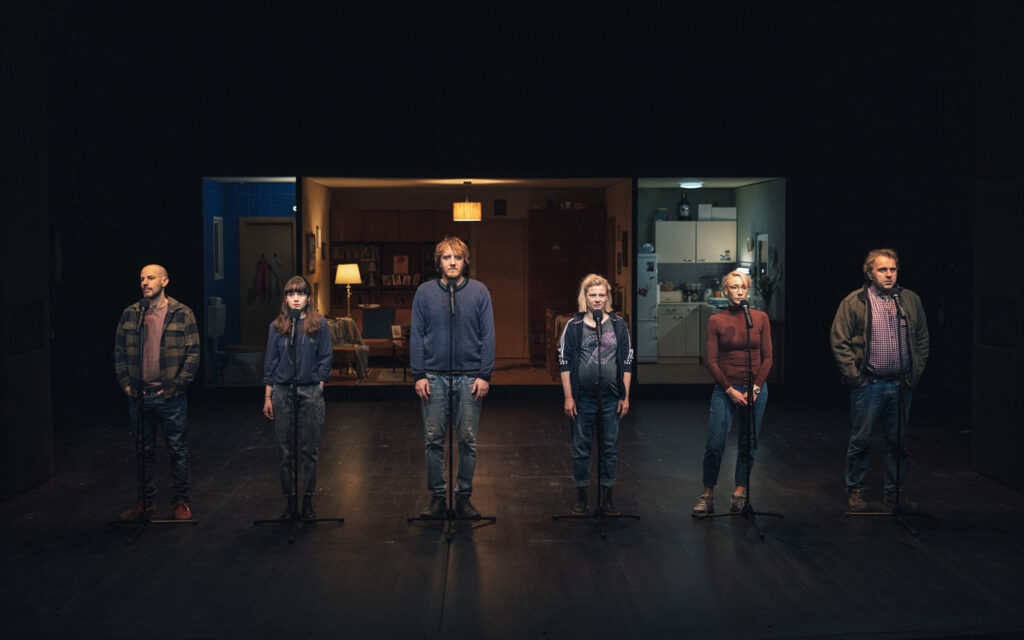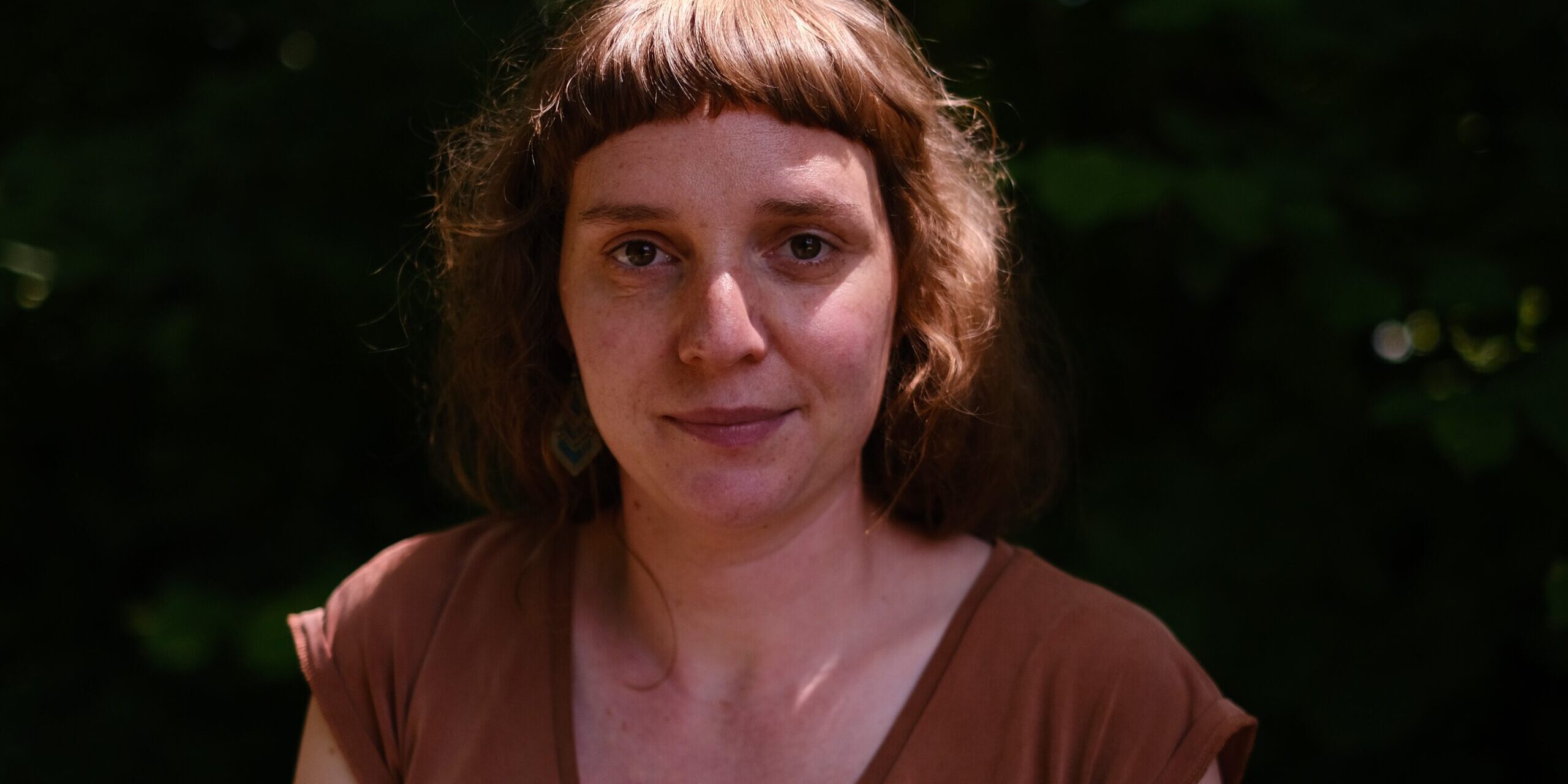Writer Katarina Morano has come to the attention of Slovenian audiences for the projects she has created with director Žiga Divjak. She talks to Živa Kadunc about their collaborative partnership, motherhood, and how her work addresses our fears for the future.
Interview edited for brevity and clarity
Živa Kadunc: You studied film directing instead of playwriting or screenwriting?
Katarina Morano: It’s true, I was studying film directing when I met Žiga Divjak and we immediately hit it off and became intertwined in our creativity. The students in that year were very auteur-oriented. That type of theatre called to me, we wanted to create everything ourselves, from the roots up. Of course another thing that called to me was working with Žiga, who is an amazing person and director. In our tandem I feel what the meaning of creation is for me and that’s where I feel most at home and creative.
Živa Kadunc: How would you describe this calling?
Katarina Morano: What attracts me to theatre is the group spirit, the co-creation, the involvement of the actors, the time you spend intensely together, when the real energy starts to flow between us and when the performance starts to emerge as a by-product of that chemistry. Filmmaking seems a bit more solitary, you have less space to search, to get to know each other, to get lost, you spend a lot of time alone with the film first before the other co-creators get involved. I feel very lucky to be able to do what I’m interested in and to be able to do and combine both.
Živa Kadunc: It’s clear in your collaborations together that your work stems both from yourselves and from the issues that affect society in a wider sense.. Where do you personally find your stimulus creatively?
Katarina Morano: When we are working together, there is no real divide. I think we complement each other perfectly, I’m a bit of a slacker, it’s hard for me to get going, but he inspires that drive in me, he sits down and does it, even that painful solitary creation at home. And I’m drawn in by the fact that he doesn’t traumatize like I do when something needs to be done. The trust, that if something is not perfect, there is a director “above you” with whom you will get through those difficulties, is of utmost importance. It takes the pressure off me to be able to count on him.

How a Tree Fell. SNG Drama Ljubljana. Photo: Peter Uhan
Živa Kadunc: Tell me more about your approach to storytelling. How a Tree Fell, about how a man’s family reacts to his efforts to stop a tree from being cut down, is a complex piece in which the story is not told chronologically
Katarina Morano: What I am most interested in writing about is how the state of the world, how this atmosphere, this pressure, is reflected in the smallest cell, say in a relationship, in a family, in the small units that then form the bigger picture. I address the issues that sting, that hurt me, and I deal with them in this way. They are not alien, they are part of me and (I hope) part of someone else. It is always important to me that the story, over time, ceases to be a story about “them” and becomes a story about “us”.
In How a Tree Fell, it was important to me that we first get to know the family well in all their cuteness and with all their problems, both spoken and unspoken. It was crucial for me that we, as viewers, find ourselves in at least one of the situations and identify with them before the protagonists find themselves in the situation of protesting against the cutting down of an old tree for the construction of luxury housing, which then irreversibly escalates the situation. It was important for me to show how, because of the rush of everyday life, we often ignore things in our immediate surroundings, we often run away from confronting the problems directly, but in the end it is perfectly ordinary people who achieve change, or at least fight for it. These are not chosen individuals but perfectly ordinary people who at some point can no longer ignore injustice.
Živa Kadunc: It seems to me that you also deal with fear a lot in your writing.
Katarina Morano: I deal with fear a lot. Given the moment we are living in, I do not find it strange at all. Everything is uncertain, and more than that, it is becoming increasingly clear that this momentum cannot be stopped. I do not know quite how one is supposed to behave in such a situation, it is quite schizophrenic, and I think that feeling is very present among people, that we are anxiously looking at each other and nobody quite knows how to take the wheel. We’re wondering if anybody will take it at all. The reality is getting more horrifying by the day. What is happening in Gaza right now would have been unthinkable to me a year ago, I would not have believed that it was possible for this to happen, that we would allow such dehumanisation, starvation and the killing of innocent children, innocent people.
And that this is still going on. Where, then, is the limit? What else has to happen for it to be enough? You cannot breathe from this, from this feeling of helplessness. Perhaps I am trying to make sense of it by writing, to find some grip, not to slip into pure pessimism.

Sediment.
Živa Kadunc: Your play Sediment (Usedline) also deals with an on the surface ‘simple” situation, in which three siblings gather to clear out theirs dead mother’s flat, yet it also is about their relationships, about going back to the past and trying to make sense of oneself.
Katarina Morano: If you compressed your whole life in a box, what would you put in it? Who are you, what have you achieved so far, which relationships are the important ones to place on this pile of life, and how does this change over time! You become a parent and a whole new world opens up! What stays behind after you’ve gone, I find this fascinating.
Živa Kadunc: Do you think motherhood drew you into thinking about transience?
Katarina Morano: Absolutely, as well as some form of confrontation with my own childhood. For me, early motherhood was a journey through my own roots, fears, patterns, attitudes, mistakes and traumas… I would say that I now know myself better and get along with myself better.
Živa Kadunc: Do you think it’s brave to have children now, in this world, which is always on the edge to some degree, always fucked, where there’s a lot of anxiety and fear of the future, which is maybe more unpredictable than ever?
Katarina Morano: This is the basis of a lot of our work. This anxiety that puts pressure on you from all possible directions, which you direct into the things around you, into family, relationships, work, children, happiness. It is impossible to capture the external part of this pressure without experiencing it from the inside. It is not easy. I am very curious about where all this is channelled, where this pressure has to go. I have the feeling that it often does not go in the right direction. And here, for example, in place of anger at the social order, anxiety appears, and your problems are directed inwards instead of outwards.
But I think it’s good to have something nice in your life to go to. For me it is my family, my friends, and I think I would be lost without them. That’s where I get my faith in the world from, a lot of good people.
Živa Kadunc: In your work you often find moments in which to incorporate humour even though you’re dealing with serious issues. In How a Tree Fell, for example, there is a scene where the two elder daughters are talking about their younger sister’s boyfriends on the phone. It feels like a moment taken from real life.
Katarina Morano: You cannot escape what you are in your writing. I am the kind of person who cries with laughter three times a day and cries with sadness three times a day. To be quite honest, I’m okay with that, I like to cry. I think that joy and sadness are inseparable, and I like to explore that in my work.
Živa Kadunc: It seems that you notice an incredible amount of detail. Do you write anything down in those moments? Do you have some kind of “external hard drive” or do you keep all of these impressions and feelings in your mind?
Katarina Morano: There’s complete chaos in my head, I don’t have the skill to sort it out, I’m in dire need of some kind of a system to sort out everything that happens to me. I’m always thinking about everything at once and it can be quite frustrating. A lot of times I have to stop a little bit to see where something is going to settle inside of me. Perhaps that’s it, that seems to be the clearest pattern for me, I like to have text in my head for a long time, piling up and up, sometimes for months- long enough that I feel like I don’t know anything anymore and that it’s all so mucked up now and I’ll never be able to write it. And then I like to sit down and write it all out in a rush. And I surprise myself by having just managed to write something. And I do it over and over again, doubting everything, but somehow it still comes out.
Maybe motherhood has helped me a little bit here too, to learn to get out of myself a little bit and not take myself so seriously anymore.
Živa Kadunc: Maybe if we looked at our lives from afar, we’d see them as a tragicomedy?
Katarina Morano: Yes, exactly, to remember that you are just one leaf on the tree. You have to force yourself to muster up that little bit of courage not to give up, to have the best time possible, to make someone else happy and to not go quietly to your grave.
Further reading: interview with Žiga Divjak: “We must completely change our value system“
Further reading: Review of Sediment
Further reading: Review of How a Tree Fell
Živa Kadunc is a critic of contemporary performance art and a speaker on Radio Študent (Slovenia). She loves her plants.








